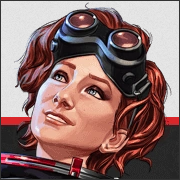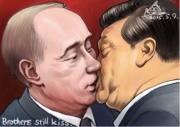- Adbot
-
ADBOT LOVES YOU
|

|
|
#
?
May 24, 2024 21:21
|
|
- R. Guyovich
- Dec 25, 1991
-

|
Proof that it was corrupt: when Gorbachev finally tried to finish what Kruschev started the place fell apart because no one trusted anyone involved with the state
lol
|
 #
?
Jan 9, 2017 20:04
#
?
Jan 9, 2017 20:04
|
|
- Atrocious Joe
- Sep 2, 2011
-
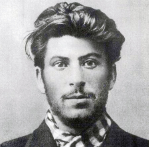
|
an honest to god marxy thread on something awful, in the year of our trump 1. im either tripping nutsack or i've time-travelled back to the days of that old-timey xtian calendar system.
gently caress, i feel a post coming on.
your categories and historical understanding aren't really working for me here. materialist ('scientific' lol) socialism/communism isn't some kind of pre-ordained systemic blueprint that you can just brute force society into. there's no roadmap to socialism because there is no platonic ideal of socialism up in the realm of forms or whatever. nobody really knows how to build socialism or what it will look like, all we really can know are the features that it won't and can't have. it has to be experimental, and (as far as i can tell) it has to be a collective dialectical interaction with material conditions.
marx made almost no positive assertions about what communism would be like, because as far as he was concerned its impossible to conceive of a new mode of production beforehand. this is one of the big sticks that he used to hit utopian and idealistic socialists with, and also why all the revolutionary successes of the 20c (however temporary) were materialist and not armchair daydreamers building utopias in their heads.
in the first waves of primitive accumulation, the emerging bourgeoisie weren't thinking 'we want to build capitalism, therefore we need to assimilate the commons and proletarianize the peasants and serfs'. all they were thinking was 'that can make me money, gimme'. that the accumulation cycle turned out to be self-reproducing and self-expanding was totally contingent. nobody knew beforehand. nobody 'planned' capitalism intentionally, even though it is a direct result of human historical praxis. once the accumulation cycle had been going on for a while people started to try to understand it and manipulate it further, and classical political economy was born.
the point being that historical understanding is always retrospective. nobody knew what capitalism was until it was already happening. nobody knew what a universe with god emperor trump would be like until it was already happening. nobody can possibly imagine what a communist world in any real detail would be like, and that's not just because of the built in retrospective nature of history, but also because the mode of production has an enormous impact on the development of the people enacting it. we can't blueprint a classless society in advance because by the time that poo poo gets rolling we will have radically changed ourselves in the making of it.
wrt the soviet union specifically, this all means that debates about defining it with a label are just as misguided as assuming that all revolutions must and always will follow that specific model. the russian revolution was the first successful class-conscious movement in the industrial age. it happened in a gigantic nation that at the time was devastated from war, had only a handful of operating factories, and was surrounded by hostile forces. everything was against them, and they were flying into the unknown without a map. that it lasted more than a week is a miracle in itself. that it had all kinds of horrific bugs, glitches, and breakdowns and was eventually assimilated and plundered isn't even remotely surprising. there's no loving training wheels for systemic change. there's no guard-rail, no big other guaranteeing meaning or success or that bad poo poo isn't going to happen. bad poo poo is going to happen, and all you can do is redirect your collective intellectual and labour praxis towards the problem until it's fixed. success in anything only happens through perpetually failing, until the chain of falsifications and negations has mapped the territory for you.
the investigation of the ussr's attempt at a new mode of production is really important, interesting, and difficult due to the cacophony of histrionic polemics and propaganda surrounding it, but structuring that investigation around a bunch of ostensibly transhistorical/universal abstractions obfuscates the concrete historical conditions, which is what marxian theory is always trying to excavate. the ussr wasn't socialist because the bureaucracy controlled the MoP and not the workers (and it failed to bring about communism). it wasn't capitalist because there was no labour market and therefore no real proletarian class - everyone had a a job, a room, and meal ticket at the least. it wasn't 'state socialist' because states are defined by their aims, organizational structure and specific social and material relations, and the soviet state was a totally new phenomenon that can't be automatically equated with other types of states without immediately loving up your a prioris (its ultimate goal was to dissolve itself into a stateless, classless society, as opposed to a bourgeois state where the goal is to perpetuate, expand and provide a crutch for the accumulation cycle). it wasn't a 'deformed worker's state' because genuine universal democracy was never completely 'there' for any significant length of time in the first place.
what the soviet union was was a specific attempt to kickstart a self-perpetuating democratic classless society in a specific place within a specific historical context and specific material conditions. the ideas, policies, techniques, and organizational strategies they used were specific interactions with those specific material conditions. they limited their aims to 'socialism in one country' because other revolutionary movements were crushed or failed to gain any impetus in the first place. they rolled with market reforms in the 20s because the country was in shambles and the emerging state apparatus had very little to work with. they liquidated the kulaks because they couldn't achieve what they were trying to do with an internal group of hostile land-owners. they collectivized agriculture on the model of the worker's soviets that were already a longstanding part of their specific culture. they built their industrial means of production around a centralized, taylorist model because that's what seemed to be working for contemporary capitalists. later on that bit them in the rear end when they were unable to continue to adequately developing the model (not to mention the resulting environmental devastation).
if there were a proletarian revolution say, tomorrow, in a core boog country, it's ridiculous to think that it would do or look anything like the ussr. we have widespread electrical infrastructure and communication systems that can talk to anyone anywhere and anytime almost instantaneously. we have a developed means of production with all kinds of new organizational structures like franchises. we have RFID tags and just-in-time manufacturing. we have ready-made gigantic vertical monopolies (walmart etc) that could be pretty easily democratized. we also have the most urgent historical necessity we have ever faced in the form of the 6th mass extinction event, which capital cannot do anything about because as the ultimate determinant of the metabolism between us and nature, it is the crisis. the material conditions and historical situation aren't even remotely comparable to the soviet situation, and you can only discover that by diving into the specific, concrete conditions and being extremely precise about what is universal and transhistorical and what is historically situated and contingent within a given situation.
if you really want to try deconstructing liberal ideology in person, i would suggest getting down to specific concepts that everyone in the conversation can understand and define, rather than throwing around the big theory labels. there are many kinds of 'socialisms' just as there are many 'capitalisms', and the vast majority of people don't even have a clue what core properties are supposed define either term in the first place. under the big abstractions lies multiplicity and fuzziness, which is why this poo poo is so hard to talk and think about (and also why thinkers that prefer to gently caress with the law of identity rather than slavishly worship it are so useful).
(USER WAS PUT ON PROBATION FOR THIS POST)
hell yeah this is that good poo poo
|
 #
?
Jan 10, 2017 06:45
#
?
Jan 10, 2017 06:45
|
|
- Larry Parrish
- Jul 9, 2012
-

by Jeffrey of YOSPOS
|
In what way is a dictator with unlimited power performing purges of those who don't agree with or rival him not resemble a fascist state.
|
 #
?
Jan 11, 2017 05:37
#
?
Jan 11, 2017 05:37
|
|
- Morzhovyye
- Mar 2, 2013
-
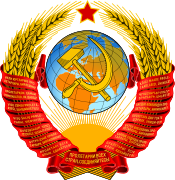
|
pictured: stalin purging everyone who disagreed with him
https://www.youtube.com/watch?v=kNS4t5UCBfI
|
 #
?
Jan 11, 2017 06:00
#
?
Jan 11, 2017 06:00
|
|
- rudatron
- May 31, 2011
-

by Fluffdaddy
|
Given that lenin died of a mysterious illness, i'm willing to bet stalin actually poisoned him
----------------
This thread brought to you by a tremendous dickhead!
|
 #
?
Jan 11, 2017 06:17
#
?
Jan 11, 2017 06:17
|
|
- rudatron
- May 31, 2011
-

by Fluffdaddy
|
its a proud russian tradition that putin has kept up
|
 #
?
Jan 11, 2017 06:18
#
?
Jan 11, 2017 06:18
|
|
- Kathleen
- Feb 26, 2013
-

-
Grimey Drawer
|
an honest to god marxy thread on something awful, in the year of our trump 1. im either tripping nutsack or i've time-travelled back to the days of that old-timey xtian calendar system.
gently caress, i feel a post coming on.
your categories and historical understanding aren't really working for me here. materialist ('scientific' lol) socialism/communism isn't some kind of pre-ordained systemic blueprint that you can just brute force society into. there's no roadmap to socialism because there is no platonic ideal of socialism up in the realm of forms or whatever. nobody really knows how to build socialism or what it will look like, all we really can know are the features that it won't and can't have. it has to be experimental, and (as far as i can tell) it has to be a collective dialectical interaction with material conditions.
marx made almost no positive assertions about what communism would be like, because as far as he was concerned its impossible to conceive of a new mode of production beforehand. this is one of the big sticks that he used to hit utopian and idealistic socialists with, and also why all the revolutionary successes of the 20c (however temporary) were materialist and not armchair daydreamers building utopias in their heads.
in the first waves of primitive accumulation, the emerging bourgeoisie weren't thinking 'we want to build capitalism, therefore we need to assimilate the commons and proletarianize the peasants and serfs'. all they were thinking was 'that can make me money, gimme'. that the accumulation cycle turned out to be self-reproducing and self-expanding was totally contingent. nobody knew beforehand. nobody 'planned' capitalism intentionally, even though it is a direct result of human historical praxis. once the accumulation cycle had been going on for a while people started to try to understand it and manipulate it further, and classical political economy was born.
the point being that historical understanding is always retrospective. nobody knew what capitalism was until it was already happening. nobody knew what a universe with god emperor trump would be like until it was already happening. nobody can possibly imagine what a communist world in any real detail would be like, and that's not just because of the built in retrospective nature of history, but also because the mode of production has an enormous impact on the development of the people enacting it. we can't blueprint a classless society in advance because by the time that poo poo gets rolling we will have radically changed ourselves in the making of it.
wrt the soviet union specifically, this all means that debates about defining it with a label are just as misguided as assuming that all revolutions must and always will follow that specific model. the russian revolution was the first successful class-conscious movement in the industrial age. it happened in a gigantic nation that at the time was devastated from war, had only a handful of operating factories, and was surrounded by hostile forces. everything was against them, and they were flying into the unknown without a map. that it lasted more than a week is a miracle in itself. that it had all kinds of horrific bugs, glitches, and breakdowns and was eventually assimilated and plundered isn't even remotely surprising. there's no loving training wheels for systemic change. there's no guard-rail, no big other guaranteeing meaning or success or that bad poo poo isn't going to happen. bad poo poo is going to happen, and all you can do is redirect your collective intellectual and labour praxis towards the problem until it's fixed. success in anything only happens through perpetually failing, until the chain of falsifications and negations has mapped the territory for you.
the investigation of the ussr's attempt at a new mode of production is really important, interesting, and difficult due to the cacophony of histrionic polemics and propaganda surrounding it, but structuring that investigation around a bunch of ostensibly transhistorical/universal abstractions obfuscates the concrete historical conditions, which is what marxian theory is always trying to excavate. the ussr wasn't socialist because the bureaucracy controlled the MoP and not the workers (and it failed to bring about communism). it wasn't capitalist because there was no labour market and therefore no real proletarian class - everyone had a a job, a room, and meal ticket at the least. it wasn't 'state socialist' because states are defined by their aims, organizational structure and specific social and material relations, and the soviet state was a totally new phenomenon that can't be automatically equated with other types of states without immediately loving up your a prioris (its ultimate goal was to dissolve itself into a stateless, classless society, as opposed to a bourgeois state where the goal is to perpetuate, expand and provide a crutch for the accumulation cycle). it wasn't a 'deformed worker's state' because genuine universal democracy was never completely 'there' for any significant length of time in the first place.
what the soviet union was was a specific attempt to kickstart a self-perpetuating democratic classless society in a specific place within a specific historical context and specific material conditions. the ideas, policies, techniques, and organizational strategies they used were specific interactions with those specific material conditions. they limited their aims to 'socialism in one country' because other revolutionary movements were crushed or failed to gain any impetus in the first place. they rolled with market reforms in the 20s because the country was in shambles and the emerging state apparatus had very little to work with. they liquidated the kulaks because they couldn't achieve what they were trying to do with an internal group of hostile land-owners. they collectivized agriculture on the model of the worker's soviets that were already a longstanding part of their specific culture. they built their industrial means of production around a centralized, taylorist model because that's what seemed to be working for contemporary capitalists. later on that bit them in the rear end when they were unable to continue to adequately developing the model (not to mention the resulting environmental devastation).
if there were a proletarian revolution say, tomorrow, in a core boog country, it's ridiculous to think that it would do or look anything like the ussr. we have widespread electrical infrastructure and communication systems that can talk to anyone anywhere and anytime almost instantaneously. we have a developed means of production with all kinds of new organizational structures like franchises. we have RFID tags and just-in-time manufacturing. we have ready-made gigantic vertical monopolies (walmart etc) that could be pretty easily democratized. we also have the most urgent historical necessity we have ever faced in the form of the 6th mass extinction event, which capital cannot do anything about because as the ultimate determinant of the metabolism between us and nature, it is the crisis. the material conditions and historical situation aren't even remotely comparable to the soviet situation, and you can only discover that by diving into the specific, concrete conditions and being extremely precise about what is universal and transhistorical and what is historically situated and contingent within a given situation.
if you really want to try deconstructing liberal ideology in person, i would suggest getting down to specific concepts that everyone in the conversation can understand and define, rather than throwing around the big theory labels. there are many kinds of 'socialisms' just as there are many 'capitalisms', and the vast majority of people don't even have a clue what core properties are supposed define either term in the first place. under the big abstractions lies multiplicity and fuzziness, which is why this poo poo is so hard to talk and think about (and also why thinkers that prefer to gently caress with the law of identity rather than slavishly worship it are so useful).
(USER WAS PUT ON PROBATION FOR THIS POST)
mighty fine post
|
 #
?
Jan 11, 2017 08:49
#
?
Jan 11, 2017 08:49
|
|
- Peel
- Dec 3, 2007
-

|
In what way is a dictator with unlimited power performing purges of those who don't agree with or rival him not resemble a fascist state.
lack of a cult of violence/action, 'popular' militias performing extralegal enforcement, pseudorevolutionary nationalist mythmaking, etc., etc.
|
 #
?
Jan 11, 2017 12:39
#
?
Jan 11, 2017 12:39
|
|
- Aeolius
- Jul 16, 2003
-

Simon Templeman Fanclub
|
lack of a cult of violence/action, 'popular' militias performing extralegal enforcement, pseudorevolutionary nationalist mythmaking, etc., etc.
the first point is open to nitpicking, considering the significant popular participation in the great purges paired with stalin's figural status. agreed on the rest though
plus any good analysis of fascism has to grapple with its material factors, i.e. its class basis. which means in the soviet case we'd have to discuss the absence of finance capital mobilizing a threatened petty bourgeoisie while displacing the depredations of class onto other identifiers (race, nation, etc); rather, the USSR dealt with class struggle in a clear-eyed and explicit way
Well then was the USSR socialist from start to finish then, or did it stop being socialist at some point before it stopped being the USSR? Obviously in a general argumentative sense Trots use state capitalism or deformed workers state or something to talk about how awesome and socialist the revolution was and then when all the inexcusably bad stuff happened it wasn't socialist anymore but if we're trying to analyse forms then we have to say 'X is Y and not Z' or we just turn everything into a blur. If I'm chatting with a bunch of people who I believe actually know theory then I might talk about the USSR potentially being a kind of authoritarian socialism, actually existing socialism, etc and giving an in depth review of its merits and failures while theorycrafting but talking to people generally then anything that comes across as 'I want to redo the USSR without any changes' is not particularly a winning argument when discussing what a socialist state will be, and if you can't say that the USSR is socialism then what was it?
i appreciate where you're coming from and i largely concur on your rhetorical points
i'm inclined to say it was socialist from the revolution until its fall, but subject to increasingly reactionary/revisionist currents over its later years, amplified by decades of mounting stagnation from mismanagement. it must be remembered that socialism is a mode of production, and even though it was frequently administered in poor ways, this much never changed until the CPSU was dissolved and the state reconstructed under shock therapy. if the government had been a dictatorship of the bourgeoisie up until that point, it would not have needed to be smashed. but, again, there were a lot of serious structural issues at play even long before this came to pass, and it's critical that socialists be willing to confront and learn from these missteps
there's no consistent definition of socialism that the USSR satisfies, that doesn't also undermine the entire point of socialism. At best you can say that the Bolsheviks were communist, they wanted to transition to socialism, but they were incapable of doing so, and the reason for that total failure has to be taken seriously. But the USSR is still state capitalist and you're a naive fool if you're not seeing that.
what are the "consistent definitions" of socialism that are confounding you? also, what is your definition of "naive fool," so I can know what I'm signing up for
|
 #
?
Jan 11, 2017 14:53
#
?
Jan 11, 2017 14:53
|
|
- rudatron
- May 31, 2011
-

by Fluffdaddy
|
Workers owning the means of production and dictatorship of the proletariat, and the USSR was neither. It was ruled by what was effectively another class of society. It wasn't capitalist, or fascists, or a monarchy or whatever, it's its own thing, but that thing is not 'socialist'.
I've no doubt that the people running the place believed they were socialist, believed they were working towards socialism, and dealing with the day-to-day problems on the USSR in the ways they felt best. The problem wasn't that they failed in that task because they weren't good enough or whatever, they failed because the system itself couldn't allow them to succeed, in the way it was set up.
|
 #
?
Jan 11, 2017 15:33
#
?
Jan 11, 2017 15:33
|
|
- Karl Barks
- Jan 21, 1981
-

|
i blame the kulaks
|
 #
?
Jan 11, 2017 15:42
#
?
Jan 11, 2017 15:42
|
|
- rudatron
- May 31, 2011
-

by Fluffdaddy
|
Like the reaction to things like the hungary revolts is telling. Read the demands of the students who started the whole thing:
https://en.wikipedia.org/wiki/Demands_of_Hungarian_Revolutionaries_of_1956
These demands weren't for a reestablishment of capitalism, they were for greater accountability, against a regime run by a guy who had used the secret police to eliminate his rivals. If anything, their demands was for a more 'real' socialism than the system they had. But the Politburo couldn't afford to let the thing get out of hand, so they had to move in. That is, the stability of the system required the removal of people advocating for policies that was closer to Communism than the USSR actually had! That's incredible, isn't it? The inability of the USSR to survive perestroika now has an alternate explanation, beyond 'the revolution was betrayed' or whatever - the power structure of the USSR, as a system, was as antithetical to the establishment of socialism as that of the USA. When the system was 'liberalized', when the fear necessary to keep the whole thing running was removed, it could not continue.
|
 #
?
Jan 11, 2017 15:44
#
?
Jan 11, 2017 15:44
|
|
- Fiction
- Apr 28, 2011
-
|
Like the reaction to things like the hungary revolts is telling. Read the demands of the students who started the whole thing:
https://en.wikipedia.org/wiki/Demands_of_Hungarian_Revolutionaries_of_1956
These demands weren't for a reestablishment of capitalism, they were for greater accountability, against a regime run by a guy who had used the secret police to eliminate his rivals. If anything, their demands was for a more 'real' socialism than the system they had. But the Politburo couldn't afford to let the thing get out of hand, so they had to move in. That is, the stability of the system required the removal of people advocating for policies that was closer to Communism than the USSR actually had! That's incredible, isn't it? The inability of the USSR to survive perestroika now has an alternate explanation, beyond 'the revolution was betrayed' or whatever - the power structure of the USSR, as a system, was as antithetical to the establishment of socialism as that of the USA. When the system was 'liberalized', when the fear necessary to keep the whole thing running was removed, it could not continue.
7. We demand the complete reorganisation of Hungary’s economic life under the direction of specialists. The entire economic system, based on a system of planning, must be re-examined in the light of conditions in Hungary and in the vital interest of the Hungarian people.
this is the one that makes people call it a counter-revolution
|
 #
?
Jan 11, 2017 15:49
#
?
Jan 11, 2017 15:49
|
|
- Prav
- Oct 29, 2011
-

|
they tried that in russia later
millions died
|
 #
?
Jan 11, 2017 16:08
#
?
Jan 11, 2017 16:08
|
|
- Aeolius
- Jul 16, 2003
-

Simon Templeman Fanclub
|
Workers owning the means of production and dictatorship of the proletariat, and the USSR was neither. It was ruled by what was effectively another class of society. It wasn't capitalist, or fascists, or a monarchy or whatever, it's its own thing, but that thing is not 'socialist'.
if by "workers owning the means of production" you mean something like distributism (you ol' chestertonian, you), then no, the USSR wasn't that. but that's definitely not the sort of socialism Marx was advocating. the point is collective ownership with broad planning to eliminate the "anarchy of production" that inheres in capitalism
i can see how many people mistake the soviet government for a new "class." this is, i think, the reason it's absolutely essential to understand dialectical materialism, or critical realism, or really any perspective (generally one or another flavor of realism) that takes into account stratification and emergence. it helps to parse things like the distinction between base and superstructure, which you're now touching upon
in a bourgeois state, the power of the capitalist class is concentrated in the economic stratum (base) while the political level (superstructural) supervenes upon it. this political one in the last instance tends to express the will of the bourgeoisie, since they either participate directly in it or influence it, either way via the aforementioned power. nevertheless, the political world still has some degree of domain autonomy, such that it's not merely reducible to "lots of applied capitalist power" — it is, all advantages aside, also a field for class struggle and even individual ambitions. and in much the same way, the political supervened upon the economic in the USSR, shaping the broad strokes of economic activity, constrained but not necessarily determined by economic relations
what you bill as "another class" (ambiguity of "effectively" aside) is in fact political leadership, which the USA has as well — as has every state that has existed or will exist. but when Marxists speak of class, we're speaking of something much more specific than "group of people who wield some manner of power"; we're describing a social relation that lives at the economic level — the basic relations of production, by which a society reproduces itself from moment to moment, day to day, year to year, and so on.
so, there's a category error at play, here. case in point: those in the capitalist world are ruled by both political elites, who tend to be beholden to a capital class, and said capital class itself. the removal of class doesn't "empower" political elites; it leaves them.
The inability of the USSR to survive perestroika now has an alternate explanation
yeah, i just don't think it's a very good one.
also the protests in Hungary were not to say "we don't have socialism, let's get some of that." i feel like this should be obvious, but: it's possible to have bad political structures and policies, as well as mass demonstrations about them, even without capitalism
like, the presence or absence of unaccountable intel agencies doesn't actually say anything about which mode of production predominates. moreover, you just recently agreed with me that declaring "no true socialist scotsman" is a lousy dodge. so why use it?
Aeolius fucked around with this message at 18:50 on Jan 11, 2017
|
 #
?
Jan 11, 2017 18:30
#
?
Jan 11, 2017 18:30
|
|
- Baloogan
- Dec 5, 2004
-
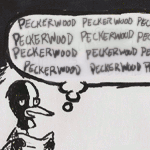
-
Fun Shoe
|
if by "workers owning the means of production" you mean something like distributism (you ol' chestertonian, you), then no, the USSR wasn't that. but that's definitely not the sort of socialism Marx was advocating. the point is collective ownership with broad planning to eliminate the "anarchy of production" that inheres in capitalism
i can see how many people mistake the soviet government for a new "class." this is, i think, the reason it's absolutely essential to understand dialectical materialism, or critical realism, or really any perspective (generally one or another flavor of realism) that takes into account stratification and emergence. it helps to parse things like the distinction between base and superstructure, which you're now touching upon
in a bourgeois state, the power of the capitalist class is concentrated in the economic stratum (base) while the political level (superstructural) supervenes upon it. this political one in the last instance tends to express the will of the bourgeoisie, since they either participate directly in it or influence it, either way via the aforementioned power. nevertheless, the political world still has some degree of domain autonomy, such that it's not merely reducible to "lots of applied capitalist power" — it is, all advantages aside, also a field for class struggle and even individual ambitions. and in much the same way, the political supervened upon the economic in the USSR, shaping the broad strokes of economic activity, constrained but not necessarily determined by economic relations
what you bill as "another class" (ambiguity of "effectively" aside) is in fact political leadership, which the USA has as well — as has every state that has existed or will exist. but when Marxists speak of class, we're speaking of something much more specific than "group of people who wield some manner of power"; we're describing a social relation that lives at the economic level — the basic relations of production, by which a society reproduces itself from moment to moment, day to day, year to year, and so on.
so, there's a category error at play, here. case in point: those in the capitalist world are ruled by both political elites, who tend to be beholden to a capital class, and said capital class itself. the removal of class doesn't "empower" political elites; it leaves them.
yeah, i just don't think it's a very good one.
also the protests in Hungary were not to say "we don't have socialism, let's get some of that." i feel like this should be obvious, but: it's possible to have bad political structures and policies, as well as mass demonstrations about them, even without capitalism
like, the presence or absence of unaccountable intel agencies doesn't actually say anything about which mode of production predominates. moreover, you just recently agreed with me that declaring "no true socialist scotsman" is a lousy dodge. so why use it?
seriously please use smalelr words and simpler sentensess
|
 #
?
Jan 11, 2017 19:23
#
?
Jan 11, 2017 19:23
|
|
- Fiction
- Apr 28, 2011
-
|
I also have no idea how that post argues that there was any democratic control over the means.
|
 #
?
Jan 11, 2017 19:45
#
?
Jan 11, 2017 19:45
|
|
- namesake
- Jun 19, 2006
-

"When I was a girl, around 12 or 13, I had a fantasy that I'd grow up to marry Captain Scarlet, but he'd be busy fighting the Mysterons so I'd cuckold him with the sexiest people I could think of - Nigel Mansell, Pat Sharp and Mr. Blobby."

|
if by "workers owning the means of production" you mean something like distributism (you ol' chestertonian, you), then no, the USSR wasn't that. but that's definitely not the sort of socialism Marx was advocating. the point is collective ownership with broad planning to eliminate the "anarchy of production" that inheres in capitalism
i can see how many people mistake the soviet government for a new "class." this is, i think, the reason it's absolutely essential to understand dialectical materialism, or critical realism, or really any perspective (generally one or another flavor of realism) that takes into account stratification and emergence. it helps to parse things like the distinction between base and superstructure, which you're now touching upon
in a bourgeois state, the power of the capitalist class is concentrated in the economic stratum (base) while the political level (superstructural) supervenes upon it. this political one in the last instance tends to express the will of the bourgeoisie, since they either participate directly in it or influence it, either way via the aforementioned power. nevertheless, the political world still has some degree of domain autonomy, such that it's not merely reducible to "lots of applied capitalist power" — it is, all advantages aside, also a field for class struggle and even individual ambitions. and in much the same way, the political supervened upon the economic in the USSR, shaping the broad strokes of economic activity, constrained but not necessarily determined by economic relations
what you bill as "another class" (ambiguity of "effectively" aside) is in fact political leadership, which the USA has as well — as has every state that has existed or will exist. but when Marxists speak of class, we're speaking of something much more specific than "group of people who wield some manner of power"; we're describing a social relation that lives at the economic level — the basic relations of production, by which a society reproduces itself from moment to moment, day to day, year to year, and so on.
so, there's a category error at play, here. case in point: those in the capitalist world are ruled by both political elites, who tend to be beholden to a capital class, and said capital class itself. the removal of class doesn't "empower" political elites; it leaves them.
But merging economic and political control, while the goal of socialism, doesn't guarantee that a system with merged economic and political control IS socialism. Or if does, then 'socialism' is far too broad for me to support without qualifiers. You need that inclusive democracy to ensure that that merged control is used for the needs of the proletariat AND that it's operating in a manner which demonstrates it's superiority over a class based system.
|
 #
?
Jan 11, 2017 19:48
#
?
Jan 11, 2017 19:48
|
|
- Baloogan
- Dec 5, 2004
-

-
Fun Shoe
|
please please plseaes small words i am not smart
|
 #
?
Jan 11, 2017 20:32
#
?
Jan 11, 2017 20:32
|
|
- Baloogan
- Dec 5, 2004
-

-
Fun Shoe
|
thanks yeah i agree
otherwise the cops who should be working for you / society are then basically private security for the boss
|
 #
?
Jan 11, 2017 20:42
#
?
Jan 11, 2017 20:42
|
|
- Dreddout
- Oct 1, 2015
-

You must stay drunk on writing so reality cannot destroy you.
|
I blame the prolix
|
 #
?
Jan 11, 2017 20:56
#
?
Jan 11, 2017 20:56
|
|
- Darkman Fanpage
- Jul 4, 2012
-

|
rich people bad! destroy rich! help poor! help working people!
that good baloogan?
|
 #
?
Jan 11, 2017 20:56
#
?
Jan 11, 2017 20:56
|
|
- Dreddout
- Oct 1, 2015
-

You must stay drunk on writing so reality cannot destroy you.
|
rich people bad! destroy rich! help poor! help working people!
that good baloogan?
Hmm yes, Marxism is blood
Dreddout fucked around with this message at 02:13 on Jan 12, 2017
|
 #
?
Jan 11, 2017 20:57
#
?
Jan 11, 2017 20:57
|
|
- Baloogan
- Dec 5, 2004
-

-
Fun Shoe
|
rich people bad! destroy rich! help poor! help working people!
that good baloogan?
yes thank you professor fanpage
|
 #
?
Jan 11, 2017 21:39
#
?
Jan 11, 2017 21:39
|
|
- Aeolius
- Jul 16, 2003
-

Simon Templeman Fanclub
|
But merging economic and political control, while the goal of socialism, doesn't guarantee that a system with merged economic and political control IS socialism. Or if does, then 'socialism' is far too broad for me to support without qualifiers. You need that inclusive democracy to ensure that that merged control is used for the needs of the proletariat AND that it's operating in a manner which demonstrates it's superiority over a class based system.
yeah no disagreement here re: the importance of robust democratic institutions. my main point is merely that socialism is a mode of production. it can have any number of political forms or contingencies, just like capitalism. as splifyphus said, just as capitalism can take many forms, there are many possible socialisms. heck, actually existing socialist states criticized each other all the time over their differences. but the existence of the KGB doesn't mean the USSR was capitalist, or some-other-system-nobody-can-define-but-apparently-wasn't-anything, as though all their goods were just dropped down chimneys by whatever the soviet version of santa claus was, i forget (which incidentally would also be a pretty kickass system)
anyway, the thing about socialism is that it doesn't even need to be an exemplary case to operate better than capitalism for the overwhelming majority of people. during its most stagnant period, right before its breakup, the USSR was still managing "only" around 2% growth a year (which lately the USA has barely been managing, itself), with no economic crises, full employment, free health care and education, and a typical household spent like 2-3% of their income on housing. most people i know would consider that a step up from their current situation
|
 #
?
Jan 11, 2017 22:01
#
?
Jan 11, 2017 22:01
|
|
- jarofpiss
- May 16, 2009
-

|
yeah no disagreement here re: the importance of robust democratic institutions. my main point is merely that socialism is a mode of production. it can have any number of political forms or contingencies, just like capitalism. as splifyphus said, just as capitalism can take many forms, there are many possible socialisms. heck, actually existing socialist states criticized each other all the time over their differences. but the existence of the KGB doesn't mean the USSR was capitalist, or some-other-system-nobody-can-define-but-apparently-wasn't-anything, as though all their goods were just dropped down chimneys by whatever the soviet version of santa claus was, i forget (which incidentally would also be a pretty kickass system)
anyway, the thing about socialism is that it doesn't even need to be an exemplary case to operate better than capitalism for the overwhelming majority of people. during its most stagnant period, right before its breakup, the USSR was still managing "only" around 2% growth a year (which lately the USA has barely been managing, itself), with no economic crises, full employment, free health care and education, and a typical household spent like 2-3% of their income on housing. most people i know would consider that a step up from their current situation
they also shot a man into space
|
 #
?
Jan 11, 2017 22:07
#
?
Jan 11, 2017 22:07
|
|
- Adbot
-
ADBOT LOVES YOU
|

|
|
#
?
May 24, 2024 21:21
|
|
- Aeolius
- Jul 16, 2003
-

Simon Templeman Fanclub
|
they also shot a man into space
for real. here's a piece i enjoyed on the meaning of the soviet space program
my understanding is that the USSR was constantly playing catch-up in the arms race, while the USA was constantly playing catch-up in the space race. if that's accurate, it says a lot. but i really haven't read enough on it
Aeolius fucked around with this message at 22:31 on Jan 11, 2017
|
 #
?
Jan 11, 2017 22:17
#
?
Jan 11, 2017 22:17
|
|










